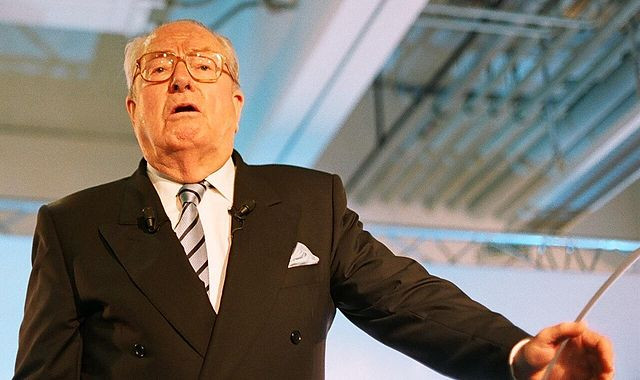Jean-Marie Le Pen, the founder of France's far-right National Front party and one of the country's most polarizing political figures, has died at the age of 96. Known for his incendiary rhetoric and staunch nationalist views, Le Pen shaped the discourse of France's far-right politics for decades, leaving behind a legacy both influential and deeply controversial.
Le Pen's death was announced by his family, who said he passed away on Tuesday at a care facility, surrounded by loved ones. Marine Le Pen, his daughter and current leader of the rebranded National Rally (RN), learned of her father's passing while returning from an official visit to the cyclone-stricken French island of Mayotte. The Elysée Palace acknowledged his death, noting his extensive role in public life over nearly 70 years, calling him "a historic figure of the far right."
Born in Brittany in 1928 to a fisherman and a seamstress, Jean-Marie Le Pen's early life was marked by hardship. His father died during World War II, leaving Le Pen to carve his own path. He joined the French Foreign Legion and fought in the wars in Indochina and Algeria, controversies from which-including allegations of torture-would shadow him throughout his career. After earning a law degree, Le Pen entered politics at 27 as the youngest member of the National Assembly, aligning himself with far-right causes.
In 1972, Le Pen co-founded the National Front (FN), which would grow to become the focal point of his political career. Under his leadership, the party combined populist nationalism, xenophobia, and anti-immigration platforms. His rhetoric, encapsulated in slogans like "French People First," resonated with disaffected voters, but his frequent antisemitic and racist remarks alienated much of the French electorate.
Le Pen's most notorious comments included dismissing Nazi gas chambers as "a detail of history" and suggesting that the Ebola virus could address global overpopulation. These statements, along with repeated convictions for contesting crimes against humanity and inciting racial hatred, cemented his reputation as a provocateur. Despite-or perhaps because of-his divisive views, Le Pen's political influence grew.
In 2002, Le Pen shocked France and the world when he advanced to the second round of the presidential election, defeating the Socialist candidate and facing off against Jacques Chirac. The result sent shockwaves through French politics, prompting massive street protests and a landslide victory for Chirac in the runoff. While Le Pen's defeat was decisive, the election demonstrated the far-right's ability to disrupt mainstream politics.
Marine Le Pen succeeded her father as party leader in 2011, seeking to modernize the movement and shed its extremist image. She renamed the party National Rally and expelled Jean-Marie in 2015 after he refused to temper his inflammatory language. Their political and personal rift became emblematic of the FN's transformation under Marine's leadership. "I'm a moral authority for the movement," Le Pen declared in 2014, resisting his daughter's reforms.
Despite his expulsion, Jean-Marie Le Pen's influence lingered. Under Marine, the RN became one of France's most powerful political forces, making it to the presidential runoff in both 2017 and 2022, where she lost to Emmanuel Macron. Analysts credit the elder Le Pen with laying the groundwork for the party's normalization and its steady rise in French politics.
Reactions to Le Pen's death mirrored his polarizing legacy. Jordan Bardella, RN's current president, paid tribute to him as a "tribune of the people" who "always served France." Conversely, far-left leader Jean-Luc Mélenchon emphasized the ongoing fight against the hatred, racism, and antisemitism that Le Pen espoused.
Le Pen's career was fraught with legal battles, from his 1990 conviction for Holocaust denial to his recent exemption from a European Union funds embezzlement trial due to ill health. His defiant stance on immigration and cultural identity remained unwavering throughout his life. Immigration is "the greatest danger we're facing," he once declared, advocating for policies that prioritized French citizens over immigrants.
Jean-Marie Le Pen is survived by his wife, Jany, and three daughters, including Marine Le Pen, who remains a central figure in French politics. While his passing marks the end of an era, the ideological battles he championed continue to shape France's political landscape. As the country reflects on his legacy, one thing is certain: Jean-Marie Le Pen left an indelible mark on French history.






